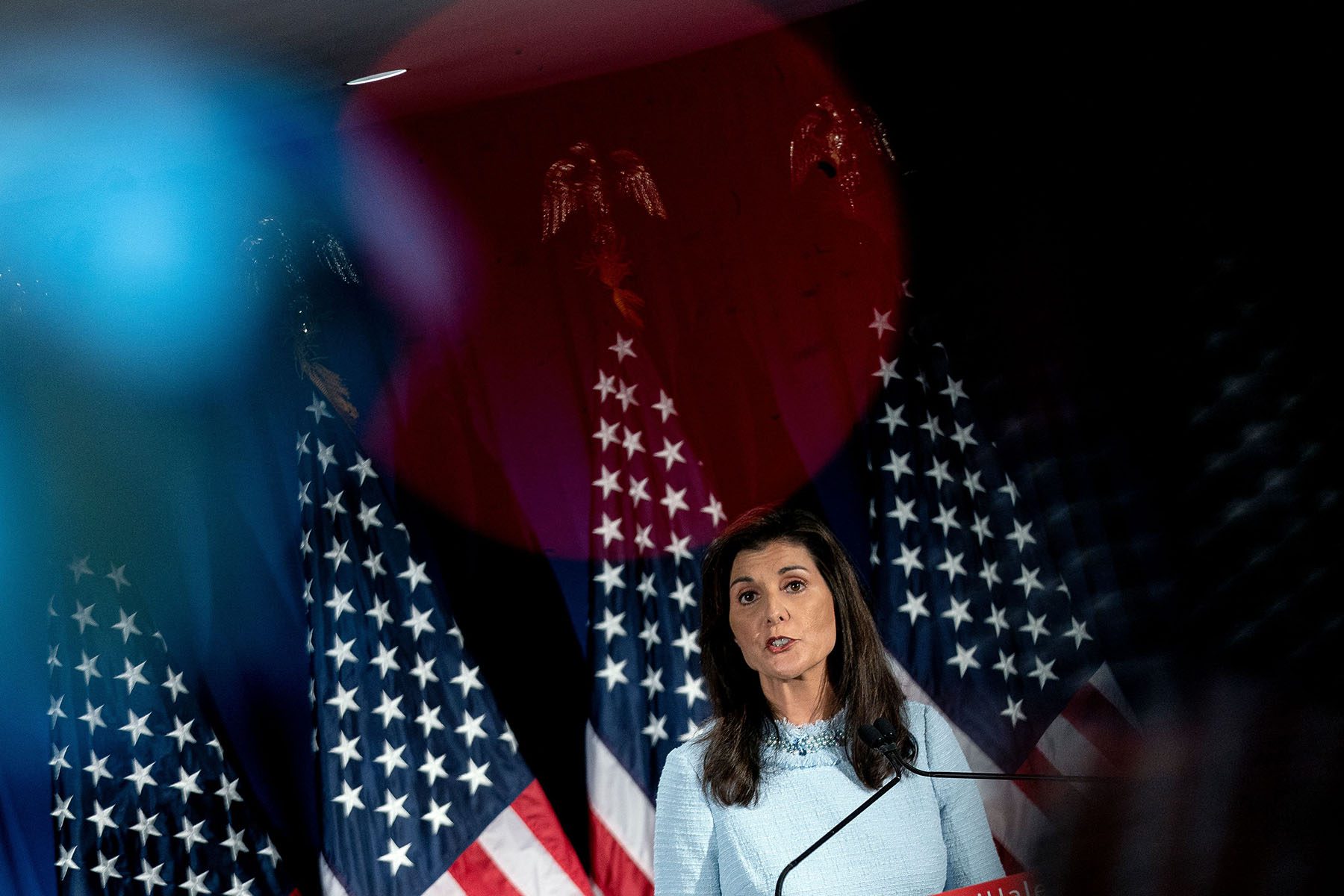Republican presidential candidate Nikki Haley said Tuesday that she sees a role for the federal government on abortion policy and called for a “national consensus” on abortion as a “practical” way of limiting the procedure in the face of divided government.
In remarks described by her campaign as a “major policy speech on abortion,” Haley emphasized her support for abortion restrictions and her long history supporting policies that restrict access to the procedure. At the same time, she made a bid for support from moderate women voters by talking about her struggles with infertility, her husband’s adoption and a friend’s rape — and urged empathy for people facing unplanned pregnancies.
“Someone’s body and someone else’s life are not things to be taken lightly, and they should not be politicized. The issue should be addressed with sensitivity and respect, not judgment and hate,” Haley said.
Haley delivered her remarks at the headquarters of the anti-abortion group Susan B. Anthony Pro-Life America, which supports a national ban at six weeks of pregnancy – a period before many people know they are pregnant. While Haley didn’t attach herself to a number of weeks or specific exceptions, SBA Pro-Life America President Marjorie Dannenfelser said in a statement after the speech that the group was “clear” on Haley’s commitment to an abortion ban after “at least 15 weeks.”
The group has made clear that it won’t support any candidate that doesn’t embrace a 15-week national ban that also allows states to enact stricter restrictions. Just last week the group chided former President Donald Trump for declining to say if he would support a national ban, calling it “a morally indefensible position for a self-proclaimed pro-life presidential candidate.”
On Tuesday, Dannenfelser praised Haley for deciding to go “toward the issue and not to run away.”
The GOP’s presidential hopefuls are walking a political tightrope on abortion restrictions, which, since the Supreme Court ruled the issue was left up to the states, have energized voters who both back and oppose them. While the Republican base supports restrictions, they are unpopular with most voters, including the majority of women, and the issue likely cost the party victories in key battlegrounds last fall.
Two April polls from The Wall Street Journal and NBC News found that nearly 60 percent of voters think abortion should be legal in all or most cases. The Wall Street Journal poll found that 53 percent of voters oppose six-week abortion bans like the one signed last week by Florida Gov. Ron DeSantis, who is widely expected to run for president. The same poll found that among those who support abortion being legal, 33 percent support some restrictions.
Meanwhile, support for strict abortion restrictions is high among Republican voters. The WSJ poll found that 68 percent support banning all abortions after six weeks of pregnancy, with exceptions for rape, incest or to save the life of pregnant patient.
With her remarks, Haley sought to center the issue of abortion in her campaign even as other Republican challengers and presumed candidates are drawing less attention to the issue. DeSantis, for example, signed a six-week abortion ban into law with a small private event announced to reporters after 11 p.m. Former Arkansas Gov. Asa Hutchinson, who is in the race, and former Vice President Mike Pence, who is not yet, have expressed support for a 15-week ban, while other candidates have been less clear about what policies they’d support.
Haley’s remarks didn’t offer much detail about what exactly she would support, beyond saying she believed in a “federal role” led by elected officials, and that she was interested in building a “national consensus” on abortion. She likened it to her work building bipartisan support for the removal of the Confederate flag from the grounds of the South Carolina state capitol after a white supremacist killed nine people at the Emanuel African Methodist Episcopal Church in 2015.
Abortion rights supporters have criticized the concept of a “middle ground” on abortion, arguing that any restrictions on abortion are a government intrusion into private healthcare decisions, particularly for women.
“Our rights and freedoms are on the line. We’ve found ‘consensus’ — and it’s supporting access to legal abortion. Nikki Haley is simply on the wrong side of voters,” said Jenny Lawson, executive director of Planned Parenthood Votes.
Haley, a former U.S. ambassador to the United Nations, said she also supports policies that protect access to “pregnancy resource centers,” anti-abortion counseling centers that seek to dissuade women from getting abortions. She said she also supports policies that protect anti-abortion physicians from work that goes against their beliefs.
At the same time, Haley said she supports expanding access to contraceptives, and criticized Republicans calling for the death penalty for people who get abortions. A failed bill before the South Carolina legislature, where she previously served as governor, would have allowed such a penalty. South Carolina is also one of two states that criminalizes women who self-manage their abortions.
“We can all agree that women who get abortions should not be jailed,” Haley said.
Haley leaned on her identity as a woman and mother to fashion herself as a strong advocate for anti-abortion policies who doesn’t “judge” people who support abortion access.
Haley said that her husband, Michael, is her primary reason for supporting abortion restrictions; Haley said he was placed in foster care and later adopted from his birth family, which included an alcoholic father and a mother who had suffered a traumatic brain injury. Haley said that after their wedding, the couple struggled to conceive for years and sought fertility treatment before having their two children.
“I desperately wanted a child … but some moms never wanted to be pregnant at all. Some are single with no one to help, and have no idea how to raise a baby while keeping a job.”
Haley didn’t say she would support rape and incest exceptions to abortion bans, but said she had empathy for a friend who was raped and feared it would result in an unwanted pregnancy.
“It was an anguish I wouldn’t wish on anyone. We can’t ignore the fears those women face,” Haley said.







